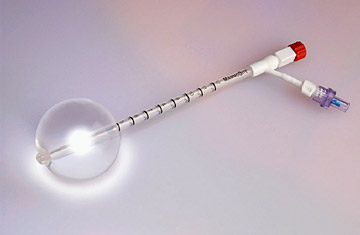
Whole breast irradiation is one of the best ways to kill off any cancer cells that linger after surgery. But the treatment requires six to seven weeks of daily exposure to potentially harmful X-rays that can sometimes trigger more cancer in healthy tissue. To reduce collateral damage, some cancer centers are experimenting with short-course therapies in women with early-stage cancer that cuts that time in half.
The use of targeted radiation devices is also becoming more commonplace. With a device called MammoSite, for example, doctors can telescope weeks of radiation treatment into just five days. Just before completing surgery to remove a cancerous lump, doctors place a balloon into the cavity left by the cancer and attach it to a catheter that remains outside the body. When radiation therapy begins, technicians send a radioactive seed containing a carefully measured dose of radiation into the balloon to zap away any remaining cancer cells. Five days later, doctors remove the balloon through the original incision.
Other smaller and more flexible devices that can reach deeper areas in the breast have also been approved by the Food and Drug Administration and are in use at cancer centers in the U.S.